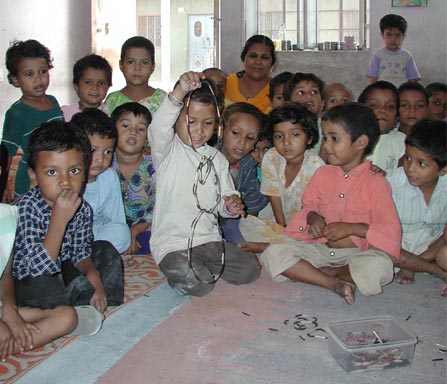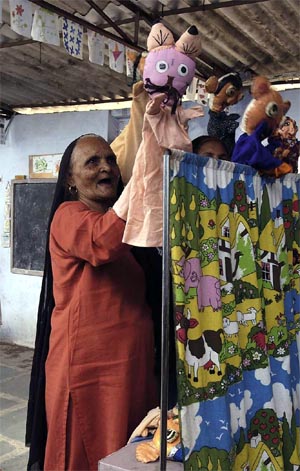Jan 22, 2026
Jan 22, 2026
by Malvika Kaul
"Hawa chali, hawa chali, peeley rang ki hawa chali" (The breeze blows, this time it is yellow in color)... As Batool Aapa and Sayida Akhtar - the two mother-teachers in Amagarh Bodhshala - sing these lines, the young children lift up yellow toys to show to their teachers. The children (between three and four years of age) are learning color recognition. As they sing and dance, they also learn new words and shapes.

Amagarh is a slum in Jaipur city, Rajasthan. Most of the families here are Muslim and polish colorful stones (for decoration and jewellery) to earn a living. The Amagarh Bodhshala (community school) started in the early 1990s.
 Although Batool aapa ('aapa' is a term for 'aunt') is around 70, her energy is that of a 20-year-old. She came to the school about 15 years ago. The school was started by Bodh Shiksha Samiti (BSS), a Jaipur-based NGO that aims to bring quality education to poor and marginalized children. The NGO works with rural communities and slum residents in Rajasthan.
Although Batool aapa ('aapa' is a term for 'aunt') is around 70, her energy is that of a 20-year-old. She came to the school about 15 years ago. The school was started by Bodh Shiksha Samiti (BSS), a Jaipur-based NGO that aims to bring quality education to poor and marginalized children. The NGO works with rural communities and slum residents in Rajasthan.
"Initially, when the Bodh team asked me to join their pre-school, I was reluctant. I am illiterate, and had never been out of the house. How could I become a teacher, I asked them," she recalls.
But, for the BSS team, Batool was the ideal mother-teacher - someone who is connected to her community, knows it traditions, is trusted and has a way with children. After a brief training, Batool's first job in her basti (neighborhood) was to interact with people on issues like family planning, safe delivery, hygiene and, eventually, education.
The initial months were tough - Batool would often find women hesitant to follow any family planning methods; some would cook in the same space where their child had defecated; many families were rigid about purdah and did not want to send their girls to school.
But Batool's persuasive powers yielded results - "I couldn't just ask people to change. I had to befriend them first," she says. Some families started sending their children to Batool aapa, the aunt they trusted. Ever since, Batool has been, as she herself says, the "harmonium, tabla, art teacher, puppeteer, nurse, traffic cop and above all, the mother of the children".
In one big room, Batool and Sayida (who is about 50) handle about 35 kids between them - Sayida gets slightly older children. "In the beginning, when the children come in, they feel lost. They can only eat or run. We involve them in different activities; create an environment for them to stay for two-three hours without their mother in a school," says Batool.
In many ways, Batool's class resembles the classroom of a private city school, offering special care and innovative methods of learning. The children sit in a circle on the floor - this makes it easier for her to give attention to each child. "When some children don't get tiffin, or get hurt in a fight, we have to take care of them as if they are our children. If they know they have a mother in the school too, they become more regular," says Batool. In fact, both Batool and Sayida are responsible for inculcating in children the first important rule for school - regular attendance.
"If a child does not come to school, we visit the home and find out what the problem is. Often, we notice that domestic conflict prevents children from being regular. We talk to both parents, individually and collectively, requesting them to resolve their conflict, which otherwise disrupts the child's education. Over the years, many families have responded positively to our suggestions," says Sayida.
Lekha Mohan, who looks after the Mother-Teacher Programme in BSS, says all the mother-teachers are appointed after consultation with the community. "A mother-teacher is the first link with the child. And a crucial link with the community."
The Mother-Teacher Programme is an integral part of the Programme for Enrichment of School Level Education (PESLE), initiated by the Aga Khan Foundation (AKF) in India and supported by the European Commission. Pre-school is an important component of child development. Worldwide, research indicates that investment in early education is critical - 85 per cent of a child's core brain structure is already formed by age three. This pre-school programme focuses on improving the child's social environment, and in some ways preparing both the child and the community for long-term education. In Rajasthan, BSS implements PESLE and the mother-teachers are part of its core team.
Mohan says the idea behind the programme is not only to sensitively introduce schooling to children, but also to empower the women in the process. Some of the mother-teachers are illiterate when they start off, but slowly educate themselves too. "When I came here, I couldn't recognize alphabets or numbers. But after my training in Bodh, I was also inspired to study. Now I can write the next day's schedule on my own," says Sayida.
Tulsi (name changed), in her mid-30s, from Agar village, Alwar, was struggling to cope with her husband's alcoholism when she was introduced to Bodh. When she became a mother-teacher, she was inspired to read and write herself and help others learn. In some years, her husband and her community saw a strong and independent woman emerge.
Many women, especially in the rural Bodhshalas, face several obstacles in the beginning. "Their husbands are suspicious and anxious, they themselves are shy and quite confused in the beginning. But a year later, they are different women altogether - confident, assertive and open to change," says Mohan. She adds that when the community sees the change in a mother-teacher's personality, it is more responsive to change itself. "A teacher has to set an example on her own."
Sayida agrees: "I got married when I was 14. I was a mother at 15. I didn't know what it was to have a child at that young age. It was so hard. I ensured that none of my daughters got married so early. There was community pressure. My neighbours often commented that my girls were getting old, but I didn't succumb to this pressure. A woman also has the right to see the world. One of my daughters is a teacher. I am confident she will get a good groom."
Gradually, the mother-teacher programme has created a large pool of women who are aware of their own rights and are able to give new direction to their community.
For Batool, the biggest achievement is that almost everyone in Amagarh has understood the value of education today. Both Batool and Sayida agree that, in recent years, they have also seen more and more women in the basti assert themselves. "More women fight domestic violence now. And many even take their in-laws to court for dowry harassment. Women are changing fast," says Sayida, with a glint in her eye.
29-Oct-2006
More by : Malvika Kaul